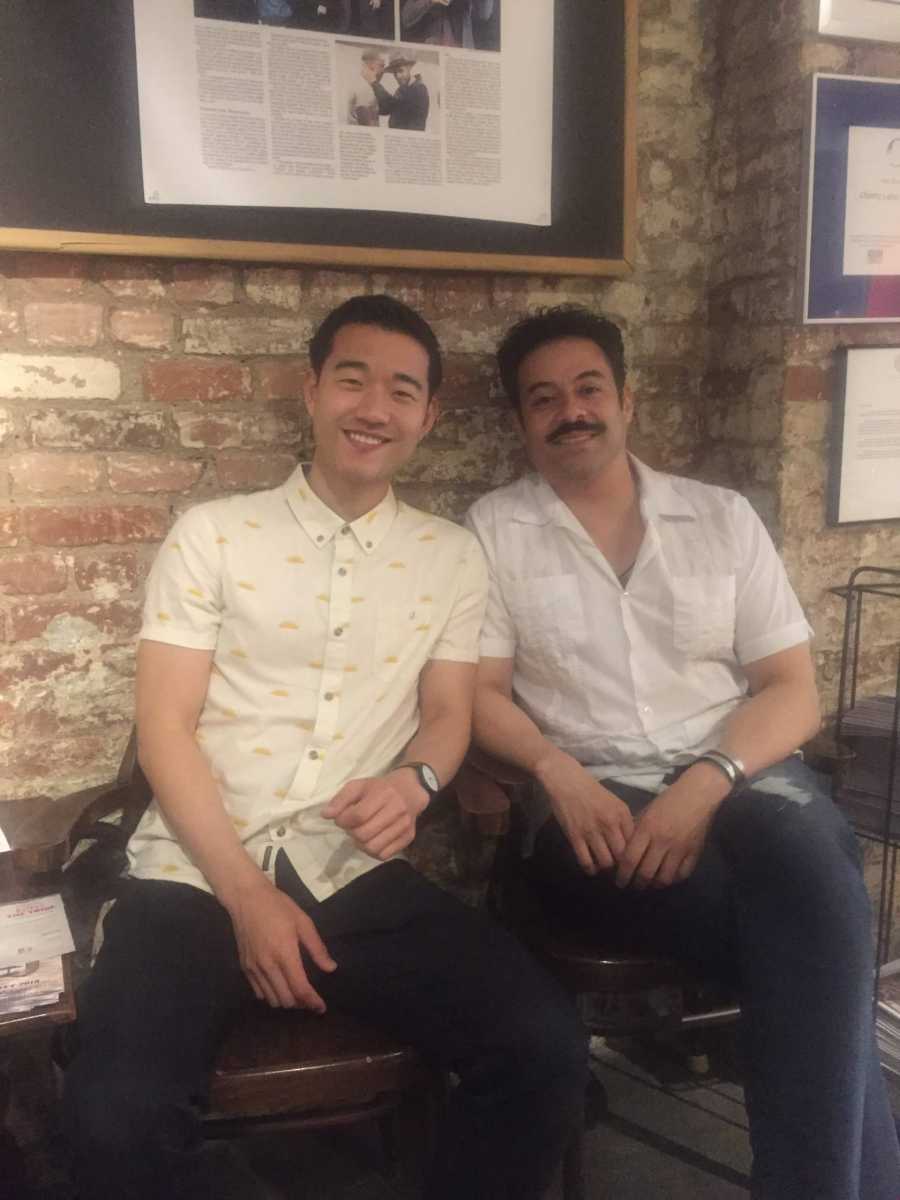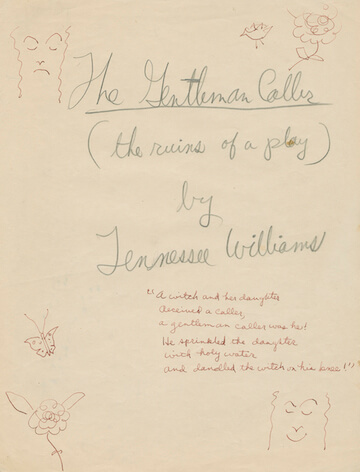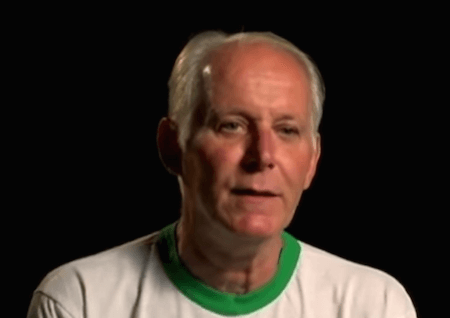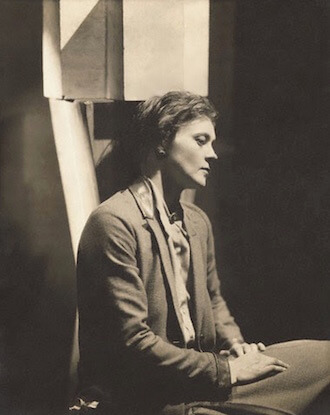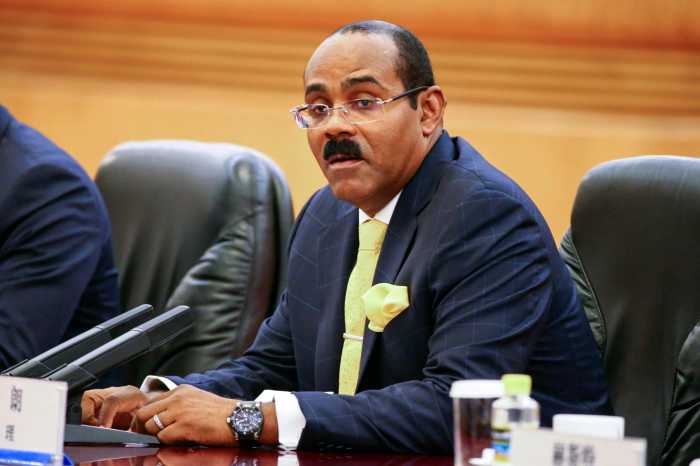Daniel K. Isaac and Juan Francisco Villa star in Philip Dawkins’ “The Gentleman Caller,” directed by Tony Speciale, at the Cherry Lane through May 26. | DAVID NOH
Tennessee Williams and William Inge: both playwrights, both gay, and both also deeply neurotic, given to substance abuse, and dead too soon: Inge a suicide at 60, in 1973, by carbon monoxide; Williams choking to death — a flop-ridden, drug and alcohol-soaked decade later — at 71, on a bottle cap he was trying to remove with his teeth. Although a spiritual bond ran deep between them, theirs was a prickly, mercurial relationship that mirrored a lot of friendships between gay men, famous or not, with elements of deep affection and compatibility, as well as deep competition and resultant wariness and enmity.
They met in 1944 in St. Louis, Williams’ hometown, where Inge was a local drama critic, and probably began a brief sexual affair, which became platonic. Williams’ star-making “The Glass Menagerie” was then in previews in Chicago, and Inge went up to see it, which inspired him to become a playwright himself. He would eventually show Williams his play, “Come Back, Little Sheba,” which so impressed Tennessee that he contacted his own agent, Audrey Wood, who took on Inge, with the result that it became his reputation-making hit in 1950, beginning a string of solid successes for him. “Picnic” won the Pulitzer prize in 1953, followed by “Bus Stop” and “The Dark at the Top of the Stairs,” all of which were adapted for the screen.
Color-blind casting enlivens portrait of an uneasy friendship
But after that, success eluded him, to hs suicidal despair, coupled with always deeply conflicted feelings about his sexuality (hidden yet discernible in all his work). Meanwhile, Williams — who became increasingly jealous of his erstwhile protégé — kept triumphing with those familiar titles that have, unlike Inge’s work, now become nigh-ubiquitous each new theatrical season: “A Streetcar Named Desire,” “The Rose Tattoo,” “Cat on a Hot Tin Roof,” “Sweet Bird of Youth,” Orpheus Descending,” “The Night of the Iguana.” But, after that, and beginning in 1963, with “The Milk Train Doesn’t Stop Here Anymore,” failure became his daily portion, with flop after flop until his swan song, “Clothes for a Summer Hotel” in 1980.
Following an earlier investigation into their relationship by Terry Teachout, just last year, playwright Philip Dawkins (“The Homosexuals,” “Charm”) has come up with another look at it, with his two-hander, “The Gentleman Caller,” at the Cherry Lane Theater, directed by Tony Speciale. In a daring — and I think wonderfully refreshing — move, Williams is played by Juan Francisco Villa, who is of Colombian descemt, and Inge by Daniel K. Isaac, a Korean American.
During rehearsals for the play, I snatched the opportunity to interview these two particularly brave actors.
“Inge isn’t as well-known today, of course, as Williams is,” observed Isaac, who has one of the most beautifully welcoming smiles in the world. “I think I was familiar with ‘Picnic,’ so yes, I had to do a lot of research. Philip turned me on to a couple of biographies about him, and I read each one of his Big Four plays in order.
“One of my best friends was assistant to Philip when he did ‘Charm,’ and also Philip’s boyfriend watched me on this Showtime series I’m on, ‘Billions,’ with Paul Giamatti and Condola Rashad, who is just the best, so funny and generous. So I got recommended when there was an early reading of it, and I’ve been with it ever since.
“I think it’s great that the Abingdon [Theatre Company] has taken a chance on two actors who would ordinarily never be considered for these roles. I was born in Los Angeles, went to the University of San Diego, and have had some luck in mostly film and TV, but theater is really my love. And, yes, for me to be cast in a popular series like ‘Billions’ is great, but we still have a long way to go before Asian faces are included as much as, say, Black or Latin, in projects that come up.”
Isaac honors the pain which haunted Inge all his life, as he was never able to be as comfortable or forthcoming about his homosexulity as the flamboyant Williams. He knows some of that, first-hand: “I was raised the only child of a single mother, who is deeply religious, Evangelical. She has a major problem with my being queer, and we go through periods of not speaking. I know that what success I’ve had comes from the Asian actors who preceded me, like B.D. Wong and Francis Jue, and you [in my very brief acting career, lol!], and I am so grateful.
“In the case of B.D., he actually fed me when I first arrived here, 10 years ago, at these dinner parties he would have at his place with his son. I actually brought my mother once so she could see what a happy and healthy gay family looked like. But afterwards, she expressed her disgust with everything and how bad she felt for the little boy in such a circumstance!”
Ah, the perversity of a Korean family, sometimes! I turned to Villa, who is straight, but with his genial compassionate eyes, wide grin, and certain vocal inflections, is physically more Tennessee than any actor I’ve ever seen do him — and I’ve seen a few — to learn if he had an easier go of it.
“I grew up on the Lower East Side, Loisada, baby, before gentrification, when white people were scared to go down there. Now they look at us like we don’t belong there anymore. My family really didn’t understand my desire to be an actor, or anything artistic.
“I went upstate to Syracuse, and went to college at Le Moyne, a Jesuit school. Yeah, like Tennessee, I’m a recovering Catholic, still wrestling with my own demons! [Laughs.] I’d always gone to Catholic schools, which kept me off the streets. I was always kind of different, more artistic, but even in that macho world I grew up in, no one ever bothered me. I found out later that that was because I’m related to certain big members of the Colombian cocaine cartel, all dead now. So, yeah, it was very weird at times.
“I’ve known Philip for 10 years, met him when I was living in Chicago, where I made many deep friendships. I came back here and trained at Maggie Flanigan, Meisner technique. I got a show at the Public, but it wasn’t easy because I got rejected by all these MFA programs, and so I determined to just go for it myself.
“I have so much admiration for the language and the richness of Williams’ work, but would never have allowed myself to actively pursue this role, no matter how much I wanted to do it. But it was Philip who contacted me because he said he saw something in my work that seemed to fit the part, and although it’s daunting to step into these particular shoes, he is always encouraging me to bring more of myself to it.”
Oh, lest you think this play is merely a deary pas-de-deux pity party, the actors assured me that it also has more than its share of lively moments. And, obviously, neither of them is a fan of fake-sipping on stage, for, as Isaac confided, with Vila’s fervent assent, “Ohmigod, we drink so much in this show. Both of us can’t wait to pee the second we get offstage!”
I applaud that commitment to their craft, but, even more, the kind of self-determination expressed by both actors is what I believe will change the still very pale face of a business that is always desperately trying to appeal to the masses, who — hello?! — now are every shade of the human spectrum and obviously would support such representation, if there were more of it. To that end, I was downright thrilled to hear that Isaac is in very healthy development with his own series about an Asian family that will address his own experience, especially in light of the dubious future of the wonderful, but criminally neglected and un-awarded “Fresh Off the Boat,” on ABC.
But let’s let Tennessee have the final word on his eternal frenemy, Inge. Isaac told me that Williams spoke at Inge’s 1973 funeral, and indeed he was the first person the actress Barbara Baxley, closer to him than anyone, called when she discovered he had died:
“Despite all of this ‘heavy’ material about his fate, Bill and his work were suffused with the light of humanity at its best. In each play, there would be one dark scene and it was always the most powerful scene. But he loved his characters, he wrote of them with a perfect ear for their homely speech, he saw them through their difficulties with the tenderness of a parent for suffering children, and they usually came out well… It is pleasant to believe that the work of an artist gives him a certain life after death, usually a thing for which he has paid anâ€enormous price and from which I am afraid he can enjoy no personal satisfaction.”
THE GENTLEMAN CALLER | Abingdon Theatre Company | Cherry Lane Theatre, 38 Commerce St., btwn. Barrow & Bedford Sts. | Through May 26″ Mon. at 7 p.m.; Tue.-Sat. at 8 p.m.; Sat. at 3 p.m. | $67 at cherrylanetheatre.org

